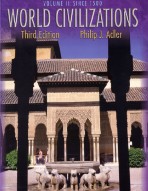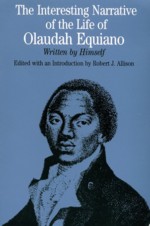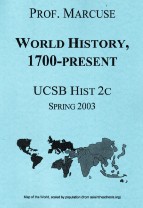Introduction and Goals
I don't think that history is a lot of information that "everyone should know." For me, it is a wealth of experiences, some of which are interesting and entertaining (like good books or movies), and some of which help me to understand and evaluate what is going on in the world around me. In this course we will study some of the historical experiences I have found to be interesting and helpful in understanding the present (we won't pass judgment on the entertainment value). Some of those experiences are the lives of exceptional people, some of ordinary people. Some are great cataclysmic events such as revolutions or wars. And some are ideas (or systems of beliefs) that have helped people to see the world around them in new ways, and have led to monumental changes in the way they--and we--live.
Along the way of learning about these experiences, we will also learn and practice some skills, such as how to understand and draw meaning from primary sources, how to think beyond the obvious level of a story to its deeper meanings, and how to express our thoughts clearly in discussion and in writing.
I realize that within a few months after a course most students will remember only a small fraction of the content of that course. (I know that even I forget many details after I am done teaching the course.) Thus I give less weight to remembering facts, and emphasize instead the mastery of skills in analysis, organization, and expression.
Requirements
- Effort. Take ownership of this course! It is yours—think of me as a guide who will help you explore some aspects of the vast terrain of world history. Let me know where you want to go, what you want to learn about, and when you are lost.
- Lectures. Attendance is required. Lectures include
images, music, videos, and information not available elsewhere in the
course. Please come on time. Arriving late or leaving early distracts
me and disturbs other students. If you must come late or leave early,
sit in the very back rows.
In lecture I do not rehash the basic information and context (that is the purpose of the textbook). Rather, I focus on more specific issues and aspects in an attempt to model how someone can interact with the material and draw out its meanings. - Discussion Sections (20%, see below). Attendance is mandatory and TAs will call roll. Preparation for section is crucial! Each week you will receive a grade for your participation in section.
- Readings and outside events. Required: a textbook, a reader of sources and articles (hyperlinked TOC), one paperback, and at least one outside event. Your second paper is based on the outside event. Suitable events are listed on the course web site.
- Writing Assignments: This course
fulfills the General Education writing requirement.
If you do not submit all writing assignments, you will fail this course.
See below for more details about the topics. - First paper (20%): An 800 word (ca. 3 page) paper, due Tuesday, April 15 in lecture. This will be an analysis of the arguments and counterarguments in Equiano's Narrative..
- Second paper draft (10%). A 1000-word (ca. 4 page) paper, due Thursday May 15 in lecture. For this paper you must attend an outside film or lecture. You will use insights and arguments from this course to analyze the presentation.
- Term paper rewrite (10%). Second paper rewrite (10%). In this version you will incorporate suggestions made by your TA on your draft. In order to receive credit, you must attach that draft version to it! Due week 9 in section. [change 5/1/03: due June 3 in lecture, 11am] You should be prepared to give a brief summary of your essay in section.
- Examinations. There will be a midterm and a final.
- In-class midterm (20%). Two IDs chosen from 10, one source interpretation, and one essay question.
- A three-hour final examination (20%) will have 3 IDs chosen
from 9, one source interpretation, one post-midterm and one comprehensive
essay question
, each chosen from two[changed 6/4/03]. A study guide will be distributed before the last class.
| Grading Section
20% |
Your TAs do most of the grading according to standards set by the professor. If you feel your work was graded inappropriately, you must discuss this first with your TA. If you are still unsatisfied, you may write an explanation, have it initialed by your TA, and submit it to me, with all of your work for the course. I may lower a grade as well as raise it. |
Discussion Sections
You must officially enroll in the section you are attending, no exceptions. Enrollment after the first day of classes is only possible with a code from the TA in charge. Students who have not attended the first two meetings of the section in which they are enrolled will be dropped automatically if other students are waiting to enroll.
You must prepare yourself for each section meeting. Please bring the appropriate texts with you, as well as some thoughts and questions about them. This is one of the most important parts of the course--your participation in section counts for 20% of your final grade.
TAs:
Sandra Dawson (sdrn@umail.ucsb.edu)
and
Carolyn Lewis (carolyn-herbst@umail.ucsb.edu).
Offices: HSSB 3225 and 3227.
Communication
Professors and students often see things quite differently, and I am very interested in feedback from you. You are always welcome to ask questions during lecture. After lecture you are also welcome to come up and talk, or walk back to the hssb with me. I'm available during my office hours, and I encourage you to contact me on e-mail (marcuse@history.ucsb.edu).
I will also be scheduling "get acquainted" visits with me during office hours early in the quarter.
And I will be attending sections throughout the quarter to find out how things are going in the course and to hear your concerns--don't hesitate to talk to me after those section visits, either.
Readings
The textbook chapters correlate roughly with the lecture
topics. You should be sure to read the assigned chapters each week, or
you will fall behind. Even at a slow pace of 15 pages/hour the textbook
readings should usually take you only about 2 hours each week.
The paperback and reader selections must be read before your section
meeting that week. Depending on how focused you are while reading, you
should plan about 8 "quality" hours for Equiano's Interesting Narrative.
Required Books (available at the UCSB and Isla Vista Bookstores, some also on reserve)
 Philip Adler, World Civilizations (3rd ed., 2003), comprehensive edition or vol. II (chaps. 33-58). Although this textbook has a strong emphasis on "the West," it also has one of the most readable and engaging narratives among world history textbooks. |
 Olaudah Equiano, The Interesting Narrative of the Life of Olaudah Equiano, or Gustavus Vassa, the African (1789), (Bedford edition), ca. $14. An antislavery autobiography by a former slave who earned money to purchase his own freedom. |
Late policy: grades will be reduced 5% per day, beginning at the start of lecture or section.
Formalities: All work must be typewritten and carefully proofread.
Use your spell checker!
At the top of each assignment you should write:
a) your name,
b) your TA's name and the section time,
c) the date, and
d) the word count (select the whole document, then
go to Tools->Word count).
- Equiano essay. (At least 800 words, ca. 3-4 pages.) Vassa/Equiano
wrote his autobiography to expose the evils of slavery and prove that
Africans are intellectually equal to Europeans. Often he anticipates
criticism and counterarguments. What are some of the justifications
of slavery that he refutes? What arguments does he make in order to
do this? Pick several and assess them: do they convince you? If so,
why, and if not, why not?
(Due Tuesday, April 15, 11am) - Event analysis. (At least 1000 words, ca. 4 pages.) Attend
several of the outside events listed on the course web site
(or others approved by your TA). Write a paragraph or two summarizing
one of them, including what the author's intention(s) and arguments
were. Then relate the film/talk/presentation to one or more of the themes
of the course. Discuss the insights that you gained by applying what
you have learned in this course.
(Due Tuesday, May 13, 11am) [correction 5/1/03: due Thursday, May 15, 11am in lecture] - Event analysis rewrite. Polish and improve your event analysis paper based on the comments your TA gave you on your first draft. Submit this version with the first, corrected draft. (Due in section week 9) [change 5/1/03: due Tuesday, June 3, 11am in lecture]
